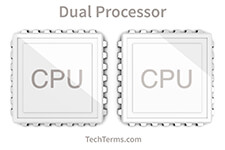Dual Processor
Dual processor refers to a computer with two separate processors. The processors work in tandem to process data using a technique called multiprocessing. Instructions are split between the two processors (or CPUs), allowing the computer to perform faster than a similar machine with only one processor.
In theory, two CPUs can process twice as much data per second than a single CPU. However, because the two processors share resources, such as L2 and L3 caches, busses, and system memory, there are bottlenecks that slow down the overall performance. Also, programs must be written to take advantage of multiprocessing, meaning the performance of an application on a dual processor machine is dependent on how the application is written. As a result, dual processor machines are noticeably faster than single processor machines, but rarely twice as fast.
Dual Processor vs Dual-Core
Dual processor is similar to dual-core, but different. A dual processor computer has two separate CPUs, which are physically separated on the motherboard. The two processors may share resources (like the CPU bus and cache), but are physically separate. In a dual-core system, the two processors are combined into a single chip that may look like one processor. Since the processors are combined into one entity, they may collectively be called a single dual-core CPU.
While dual processor and dual-core have two different meanings, they are not mutually exclusive. Some systems have two dual-core CPUs, totally four processing cores. Desktop computers may have four, six, or eight separate processors. High-end scientific computing machines can go way beyond dual processor configurations and may include dozens of processors.
 Test Your Knowledge
Test Your Knowledge